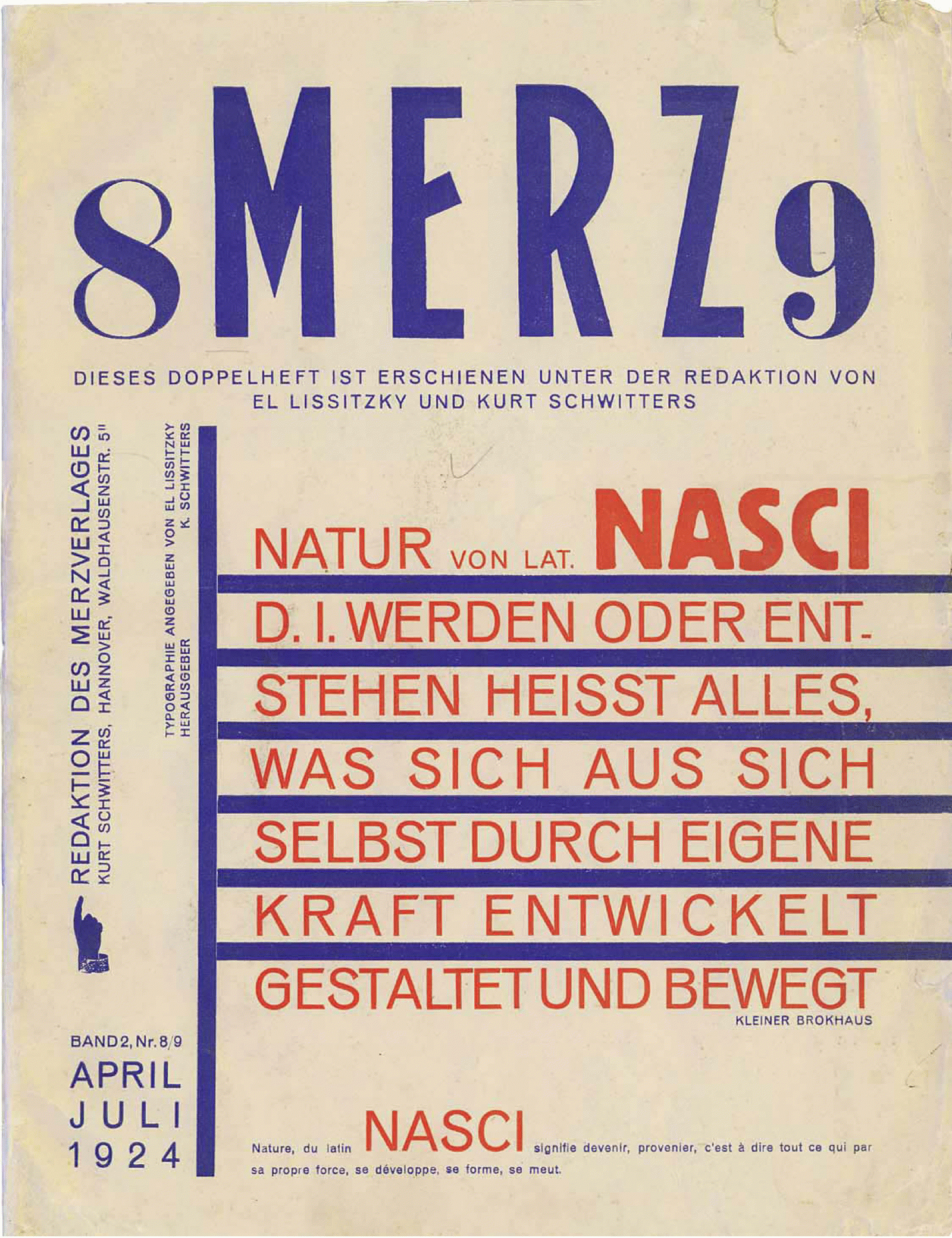4A Lab Seminar
Carlotta Castellani: "Plants as Inventors": the impact of Raoul Heinrich Francé's theories on El Lissitzky in the context of the International Constructivist Movement

Cover of Merz 2.8/9, April/July 1924
The project aims to study the influence of the writings of the Hungarian neo-lamarkian botanist Raoul Heinrich Francé (1874-1943) on the activity of the Russian artist El Lissitzky between 1922 and 1925. Starting point of the research is a comparison between Francé's books Die Pflanze als Erfinder (Stuttgart 1920) and Bios: Die Gesetze der Welt (Stuttgart, 1923) with the special issue of the Modernist magazine «Merz» entitled Nasci, edited by Lissitzky in collaboration with Kurt Schwitters in April 1924. The apparent distinction between the concepts of biology and engineering presented a challenge by 1920's through the concept of "Biocentrism": as Oliver I. Botar points out, many artists and architects referred to the word Biozentrik, a German term for the early twentieth-century worldview based on trends such as Biologism, Vitalism, Organicism, Holism and Lebensphilosophie. The hungarian-born botanist Raoul Francé was the Director of the Munich Biological Institute and the editor of «Aufbau der Entwicklungslehre», the central journal of psycho-biological movement. By 1923 a chapter of his book Die Pflanze als Erfinder (Plants as Inventors) appeared in the Berlin art journal «Das Kunstblatt». In this text Francé discussed his idea of Biotechnik, literally "the technological mechanisms of living beings", providing a rich basis for the belief in integration of biological processes with technology. He believed that biotechnics could realize the possibility of harmony between man, nature and technology and he looked to natural phenomena as model for engineers. For this reason, his books are full of illustrations coming from the natural world and they became a source of inspiration for artists and architects such as Laszlo Moholy-Nagy, Fritz Neumeyer, Mies van der Rohe and El Lissitzky. Since the ideas of Francé were widely known, the project therefore aims to study the correlations between Raoul Francé's and the ideas promoted by International Constructivist Movement through numerous magazines published in different countries in a particular period of time (1922-1925). The focus of the study is on Lissitzky's articles, letters and works of art produced between 1922 and 1925. They will be compared with France's theories to show the gradual overcoming of Suprematism and Constructivism and the parallel development of a more "universal language", with the assimilation of multiple sources that soon will become an international language of design.
Carlotta Castellani received her Ph.D. in Art History, Literature and Cultural Studies in a joint program of the Universities of Florence and Paris IV Sorbonne (2016) with a dissertation on The myth of the artist and of the work in Balzac's "Le chef d'œuvre inconnu". She is currently working on a book edited with Max Seidel on the subject. At the Kunsthistorisches Institut in Florenz, she was Wissenschaftliche Assistentin of Max Seidel (2009–2017). During her doctoral studies, she was awarded a fellowship from the Fondazione Leone Ambron Castiglioni (2014), she worked at the Soprintendenza Archeologia, Belle Arti e Paesaggio in Florence (2016) and, since 2014, she has been responsible for the historical archive of the German artist residency Villa Romana. In 2019 she was awarded a Postdoctoral Fellowship at the Center for Italian Modern Art in New York, in a joint program with the Graduate Center of the City University of New York.
Online 4A-Lab Seminar
Avviso
Questo evento viene documentato fotograficamente e/o attraverso riprese video. Qualora non dovesse essere d’accordo con l’utilizzo di immagini in cui potrebbe essere riconoscibile, da parte del Kunsthistorisches Institut in Florenz a scopo di documentazione degli eventi e di pubbliche relazioni (p.e. social media) la preghiamo gentilmente di comunicarcelo.


